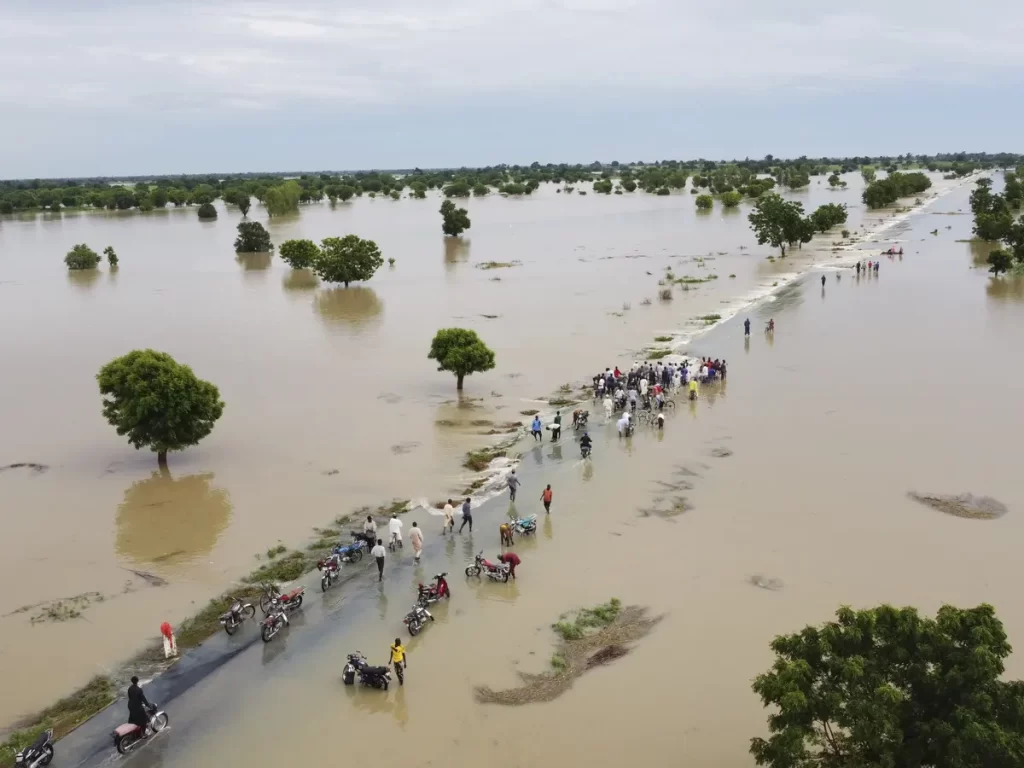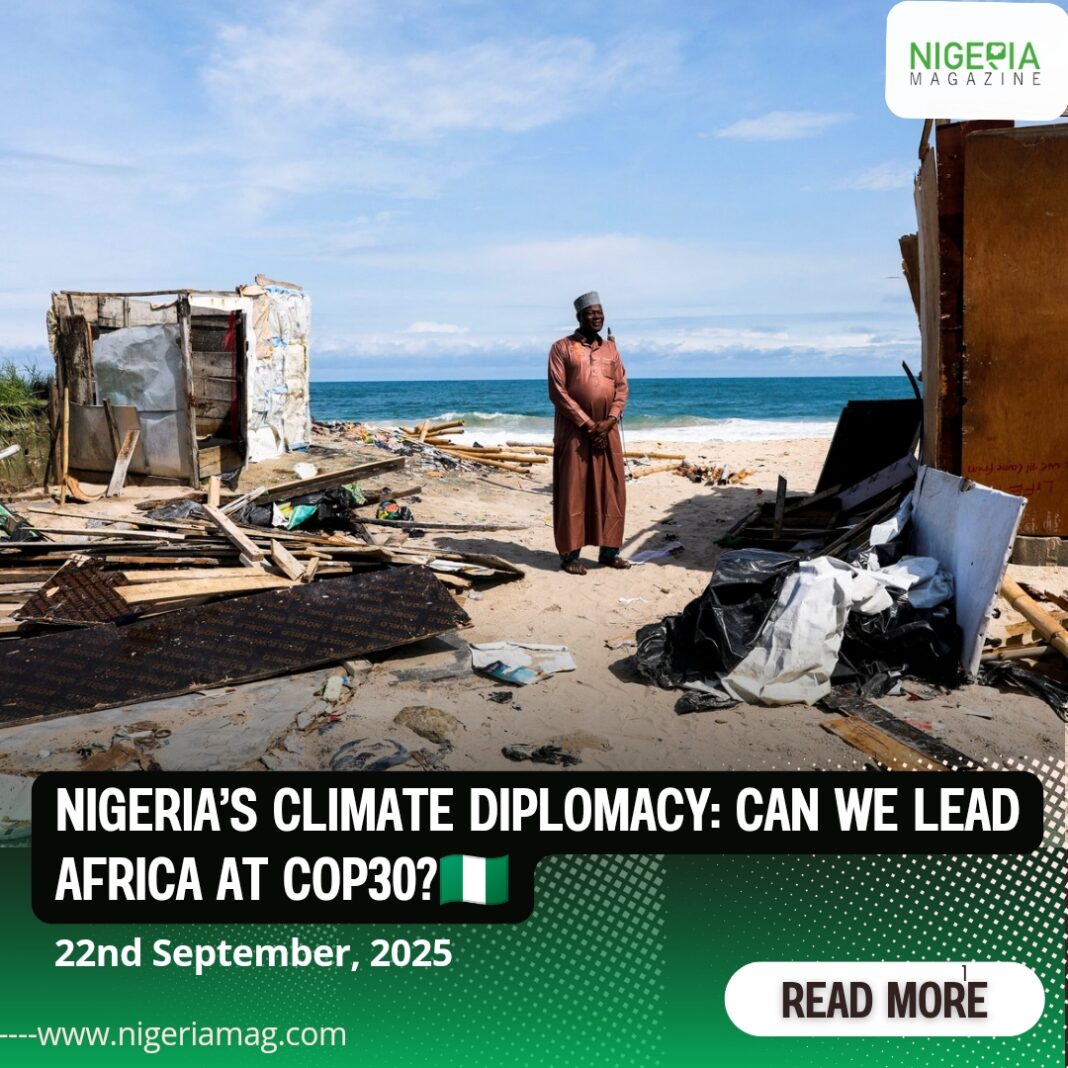As the world looks toward COP30, set to take place in Belém, Brazil in 2025, the role of African nations in shaping global climate negotiations has never been more critical. Among the continent’s heavyweights, Nigeria finds itself at a pivotal juncture. With its vast population, strategic influence in African politics, and status as the continent’s largest oil producer, Nigeria has both a responsibility and an opportunity to spearhead Africa’s climate diplomacy on the global stage. But the question remains: can Nigeria truly lead Africa at COP30?
Nigeria’s Climate Profile
Nigeria faces a unique climate paradox. On one hand, it is highly vulnerable to the adverse impacts of climate change. From desertification in the north and rising sea levels threatening the coastal megacity of Lagos, to flooding and declining agricultural productivity, the nation’s development trajectory is already under strain. On the other hand, Nigeria is a fossil-fuel giant. Oil accounts for the bulk of government revenue and foreign exchange earnings, even as global decarbonization threatens the very foundation of this economy.

This paradox complicates Nigeria’s climate diplomacy. The country must balance domestic energy and development needs with global climate responsibilities, all while attempting to attract climate finance and investment into renewable energy and adaptation.
Nigeria’s Diplomatic Assets
Nigeria is not without strengths that position it to lead. Firstly, its population of over 220 million makes it the largest African market, giving it significant clout in continental and global negotiations. Secondly, Nigeria has demonstrated growing political will in climate matters. The Climate Change Act of 2021, which established a National Council on Climate Change (NCCC), was a landmark step toward mainstreaming climate governance. Additionally, Nigeria’s updated Nationally Determined Contribution (NDC) commits to reducing greenhouse gas emissions by 47% by 2030, conditional on international support.
Nigeria has also actively participated in climate summits, championing issues such as climate finance, loss and damage compensation, and the energy transition agenda for Africa. President Bola Tinubu, since assuming office in 2023, has emphasized green growth and renewable energy as part of Nigeria’s future economic strategy. If this momentum continues, Nigeria could frame itself as Africa’s chief advocate at COP30.
Challenges to Leadership
However, leadership will not come easily. Nigeria faces several internal and external challenges that could undermine its credibility at COP30.
Dependence on Fossil Fuels: Nigeria’s economy remains heavily reliant on oil and gas. Without clear and actionable steps to diversify, Nigeria risks being perceived as paying lip service to climate commitments.
Weak Implementation Capacity: While Nigeria has enacted progressive policies, implementation remains a bottleneck. Institutional weakness, bureaucratic inefficiencies, and corruption hinder effective climate governance.
Energy Access Gap: Over 80 million Nigerians lack access to reliable electricity. For Nigeria to lead credibly, it must champion energy transition models that balance decarbonization with expanding energy access for its citizens.
Continental Competition: Other African states, particularly South Africa, Kenya, and Egypt, have positioned themselves as climate leaders with tangible renewable energy projects and diplomatic visibility. Nigeria must articulate a distinct agenda to outpace these competitors.
Pathways to Leadership
For Nigeria to lead Africa at COP30, it must leverage its diplomatic weight while addressing its domestic contradictions. Several pathways are available:
Championing Climate Finance: Africa’s biggest demand remains finance for adaptation and just energy transitions. Nigeria could spearhead a unified African position that pushes developed nations to fulfill the $100 billion annual pledge and expand financing for loss and damage.
Promoting Just Energy Transition: Nigeria could propose a blueprint that prioritises gas as a transitional fuel, while accelerating investments in solar, wind, and hydro power. By positioning itself as the architect of Africa’s just transition, Nigeria could reconcile its fossil fuel dependency with future green ambitions.
Strengthening Regional Alliances: Nigeria must work closely with the African Union, ECOWAS, and climate-vulnerable states such as small island nations. Building coalitions would amplify Africa’s negotiating power.
Showcasing Domestic Successes: Leadership abroad requires credibility at home. Demonstrating progress in climate-smart agriculture, renewable energy projects, and flood management systems would give Nigeria moral authority at COP30.
Leveraging Youth and Civil Society: Nigeria has one of the largest youth populations in the world, many of whom are engaged in climate advocacy and innovation. Amplifying their voices at COP30 could strengthen Nigeria’s narrative as a forward-looking, people-driven leader.
The Stakes for Africa
Africa contributes less than 4% of global emissions but suffers disproportionately from climate impacts. At COP30, the continent’s priorities will include scaling adaptation finance, ensuring equitable energy transitions, and operationalizing the loss and damage fund established at COP27. Nigeria’s ability to rally African states behind a unified agenda will be critical in determining how forcefully these issues are advanced.
Nigeria’s leadership at COP30 is not guaranteed, but it is possible. The country stands at a crossroads between being a passive participant in global climate negotiations or an active leader shaping Africa’s destiny in the climate era. To seize the moment, Nigeria must confront its internal contradictions, demonstrate real progress at home, and champion Africa’s collective interests abroad.
The world will be watching in Belém. Whether Nigeria rises to the occasion could define not just its climate future, but Africa’s role in global climate governance for years to come.


